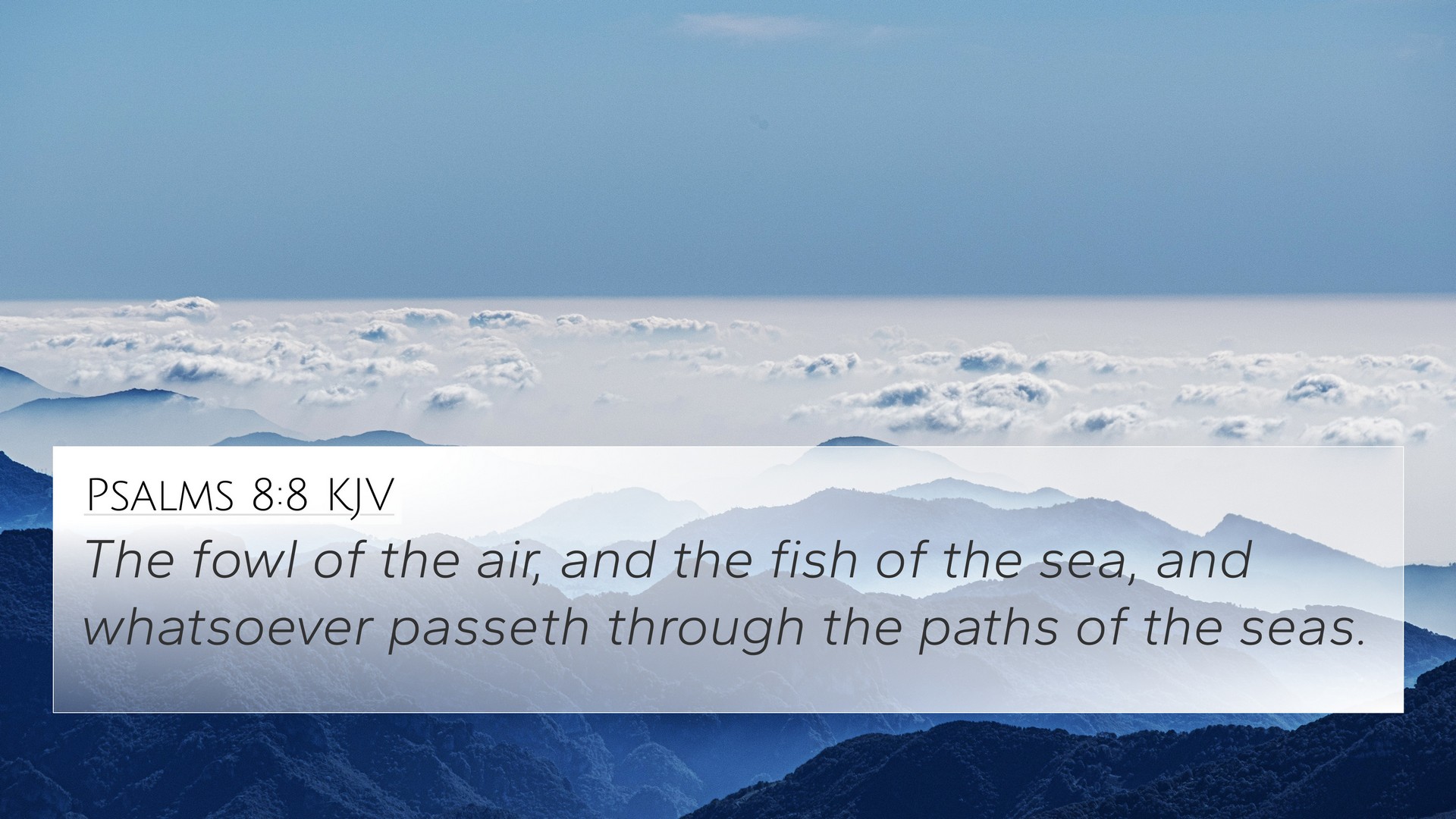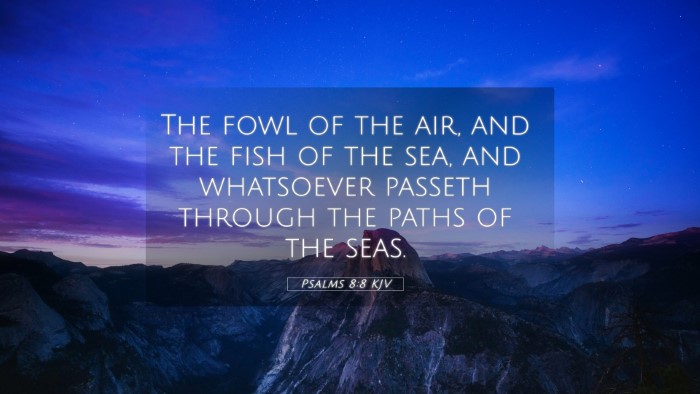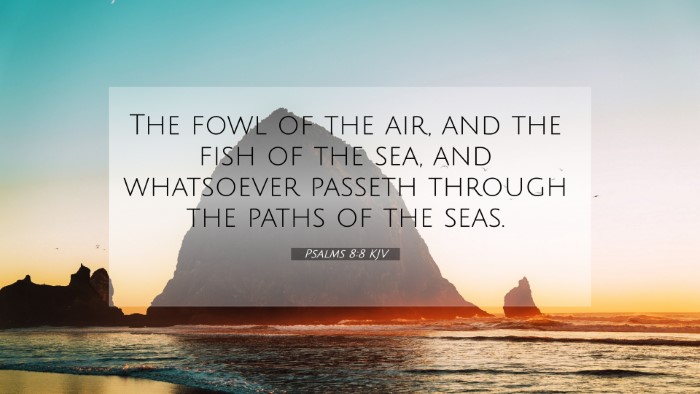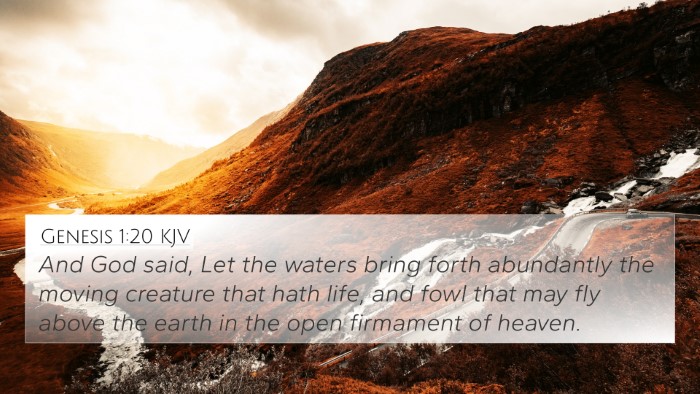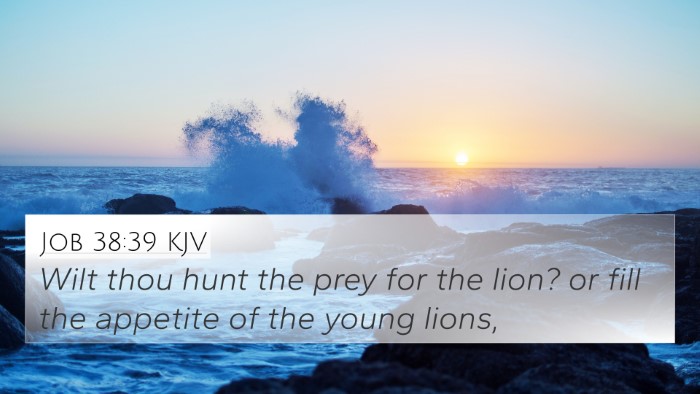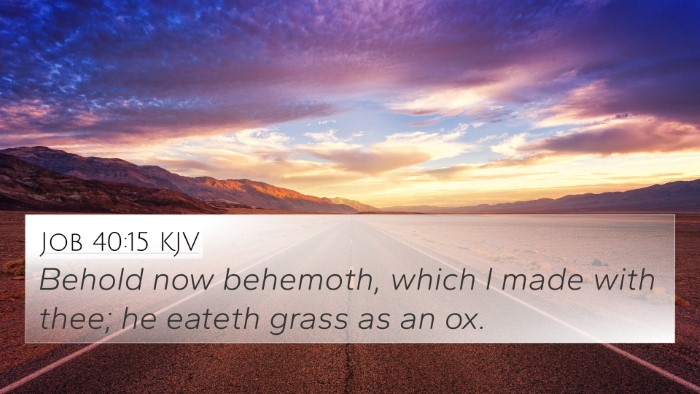Psalms 8:8 Meaning and Interpretation
Psalms 8:8 (KJV) states, "The fowl of the air, and the fish of the sea, and whatsoever passeth through the paths of the seas." This verse highlights the dominion of humanity over the creatures of the earth and provides deep theological insights regarding God's creation and our stewardship over it.
Summary of Insights from Public Domain Commentaries
Matthew Henry Commentary
Henry emphasizes that this verse illustrates God's magnificence in creation and humanity's place within it. He notes the significance of 'fowl of the air' and 'fish of the sea' as symbols of God's provision. Humanity is granted dominion, signifying responsibility as caretakers rather than exploiters. Henry stresses that recognizing this dominion should lead to humility and gratitude towards God.
Albert Barnes Commentary
Barnes expounds on the idea of God’s creative order and man's role within it. He interprets the 'paths of the seas' as an acknowledgment of the wonders of nature and the unseen depths of God's creation. This verse serves as a reminder that all living things are under human stewardship and should thus instill a sense of accountability for how we interact with the natural world.
Adam Clarke Commentary
Clarke reflects on the poetic nature of this verse, recognizing its lyrical beauty, and connects it to the theme of divine care for creation. He points out that 'whatsoever passeth through' implies both the known and unknown elements of the earth's ecosystems and how humanity is to recognize its part in this intricate web. Clarke emphasizes that dominion is not synonymous with abuse but rather with thoughtful governance of the earth.
Connections Between Bible Verses
- Genesis 1:28 - "And God blessed them, and God said unto them, Be fruitful, and multiply, and replenish the earth, and subdue it..." - Affirms humanity's dominion over creation.
- Psalm 104:25-26 - "So is this great and wide sea, wherein are things creeping innumerable, both small and great beasts..." - Celebrates God's creation and the life within the seas.
- Matthew 6:26 - "Behold the fowls of the air: for they sow not, neither do they reap..." - Highlights God's care for all creatures, suggesting humans should reflect that care.
- Genesis 2:19 - "And out of the ground the Lord God formed every beast of the field, and every fowl of the air..." - Discusses the creation of animals and man's role in naming them, symbolizing authority.
- Job 12:7-10 - "But ask now the beasts, and they shall teach thee; and the fowls of the air, and they shall tell thee..." - Suggests that creation has a voice and teaches humanity profound truths.
- Isaiah 40:26 - "Lift up your eyes on high, and behold who hath created these things..." - Invites humans to recognize God's sovereignty over the universe.
- Hebrews 2:6-8 - "But one in a certain place testified, saying, What is man, that thou art mindful of him? or the son of man, that thou visitest him?" - Reflects on humanity’s significance in God’s creation plan.
Thematic Bible Verse Connections
The verse addresses fundamental themes of creation, dominion, and stewardship found throughout Scripture. The relationships between these verses underscore the intrinsic value of all life and humanity's role in affirming and respecting that value.
Understanding Psalms 8:8 provides a holistic view of scriptural themes related to nature, responsibility, and divine order, reinforcing the need for comprehensive Bible cross-referencing and contextual analysis.
Cross-Referencing Biblical Texts
Employing tools for Bible cross-referencing, such as a Bible concordance or a Bible cross-reference guide, can enrich the study of this verse. By integrating various scriptures, one can identify both similarities and contrasts that pave the way for a deeper understanding of biblical themes.
How to Use Bible Cross-References
Utilizing cross-reference Bible study methods allows one to delve into the connections between verses such as Psalms 8:8 and related passages theme-wise or contextually. This study method ultimately promotes a richer understanding of scriptural dialogue and theological concepts.
User Intent and Cross-Referencing Resources
For those seeking to understand what verses are related to Psalms 8:8, exploring a Bible reference resource can be immensely helpful. Identifying connections between Old and New Testament teachings provides a more cohesive view of the biblical narrative regarding creation and dominion.
Conclusion
Psalms 8:8 invites readers to not only acknowledge humanity's place within God's creation but also to act responsibly as stewards of the earth. Through cross-referencing Biblical texts, one can appreciate the interconnectedness of scripture and the overarching divine narrative that speaks to the relationship between God, humanity, and all creatures.
